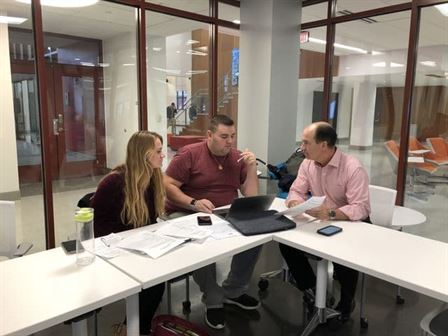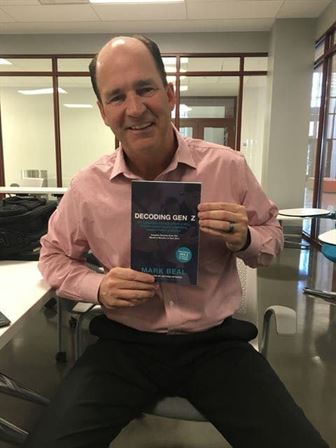From teaching the students at Montclair State University to going home and working on his latest book, adjunct public relations professor Mark Beal does it all. In his new book “Decoding Gen Z,” the author and educator explores the culture of the next generation.
“The oldest members of the generation just graduated college,” Beal said. “Marketers, employers and media companies are starting to shift away from millennials and toward Generation Z.”
Unlike his previous two books, “101 Lessons They Never Taught You In College” and “101 Lessons They Never Taught You About Going To College,” writing “Decoding Gen Z” was different for Beal. He admits that he had to do a wide selection of research. He checked out social media, media preferences and many work sites of Generation Z to help him format the book.
Beal interviewed individuals ranging from ages of 13 to 23 without traveling to write this book.
“I started interviewing [people] on the phone and in person, for about an hour each,” Beal said.

Mark Beal (right) sits in class with senior public relations majors Megan Daniel (left) and Nick Mattiello.
Jeremy Wall | The Montclarion
The interviewees consisted of high school freshmen to college graduates, all living in states stretching from Connecticut to California. Some of the people he spoke to consisted of Montclair State students.
“It hones in on the elements of our generation,” said senior public relations major Nick Maniello. “It’s who we are.”
Many of the questions ranged from what they did on social media, asking if they read newspapers and if they watched television and various other things.
“After the interviews, I had to compare what they said versus the survey and the studies,” Beal said.
The author and educator also admitted that the process for writing this book was lengthier than usual because he had to check for accuracy.
“I had to make sure that whatever I put in there if a Gen Z picked up that book, they would nod their head and say, ‘Yeah,'” Beal said. “I was hearing all this terminology and lexicon that I never heard of and didn’t understand.”
Despite terminology and lexicon being massive, it was the ages of the interviewees that a made a difference and what they are good at.
“A 13-year-old was more tech-savvy and giving me more insights than a 22-year-old,” Beal said.
Other things Beal learned was the future of certain social media sites, what they typically do not watch and where they are turning to for TV content.
“Facebook has no future with Generation Z, they typically don’t watch the morning or evening news, and they are not watching traditional or network TV,” Beal said. “The majority are turning to Netflix for content.”
Despite various Generation Z members doing those things, junior television and digital media major Collin Mulligan disagreed.
“We still take in information on television,” Mulligan said. “Nowadays, it’s just more on the go.”



